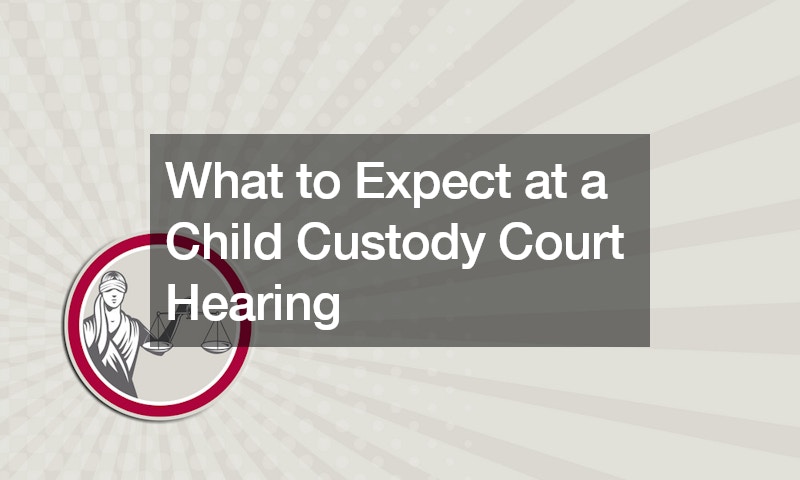
Child custody court hearings can be daunting experiences, whether you’re navigating the legal process as a self-represented individual or with the assistance of a child custody lawyer. Understanding what to expect and how to prepare for these hearings is crucial for advocating for the best interests of your child. In this comprehensive guide, we’ll delve into the key aspects of child custody court hearings, from preparation to proceedings and potential outcomes.
Preparation is Key
The journey towards a child custody court hearing begins long before the actual date in court. Whether you’re representing yourself or have legal representation, thorough preparation is essential.
This involves gathering all relevant documents related to your case, including custody agreements, parenting plans, communication records, and any evidence supporting your position. If you have a child custody lawyer, they will guide you through the preparation process, helping you understand what documents are necessary and how to present them effectively in court.
Understanding the Process
Child custody court hearings follow a structured process designed to address the specific issues related to the custody arrangement. Typically, both parties involved in the dispute will be required to appear in court, along with their legal representatives if applicable. The judge presiding over the case will listen to arguments from both sides, review evidence presented, and make a decision based on the best interests of the child.
Presenting Your Case
During the child custody court hearing, each party will have the opportunity to present their case to the judge. This may involve providing testimony, calling witnesses, and submitting evidence to support your position. If you’re representing yourself, it’s essential to articulate your points clearly and concisely, focusing on the factors that demonstrate your ability to provide a stable and nurturing environment for your child. A child custody lawyer can help you prepare your testimony and evidence, ensuring that your case is presented effectively in court.
Factors Considered by the Court
When making a decision regarding child custody, the court considers various factors to determine what arrangement is in the best interests of the child. These factors may include the child’s relationship with each parent, their physical and emotional needs, the stability of each parent’s home environment, and any history of abuse or neglect. The judge will carefully weigh these factors to reach a decision that promotes the child’s well-being and ensures their safety and security.
Potential Outcomes
After hearing arguments from both parties and reviewing all relevant evidence, the judge will issue a custody order outlining the terms of the arrangement. This order may grant sole custody to one parent or establish a joint custody arrangement, depending on the circumstances of the case. In some instances, the court may also order supervised visitation or impose restrictions on parental rights to ensure the child’s safety.
Navigating Post-Hearing Procedures
Once the child custody court hearing concludes and a custody order is issued, both parties are required to comply with the terms outlined by the court. This may involve implementing a visitation schedule, attending co-parenting classes, or engaging in mediation to resolve disputes amicably. If you have a child custody lawyer, they can assist you in understanding your rights and responsibilities under the custody order and help you navigate any post-hearing procedures.
Parenting Plans
Parenting plans are comprehensive documents that outline the custody and visitation arrangements for children involved in a divorce or separation. They serve as a roadmap for co-parenting and help mitigate conflicts by providing clear guidelines for parental responsibilities. Here’s a closer look at what parenting plans entail:
1. Custody Arrangements: Parenting plans specify the type of custody each parent will have, whether it’s joint physical custody, sole physical custody, joint legal custody, or sole legal custody.
2. Visitation Schedule: They establish a visitation schedule detailing when the child will spend time with each parent, including weekends, holidays, and vacations.
3. Decision-Making Authority: Parenting plans allocate decision-making authority regarding important aspects of the child’s life, such as education, healthcare, and religion.
4. Dispute Resolution: They outline procedures for resolving disputes that may arise between parents regarding the implementation of the parenting plan.
5. Communication Guidelines: Parenting plans may include provisions for communication between parents, such as methods of contact and frequency of updates about the child’s well-being.
6. Flexibility Clause: Many parenting plans include a flexibility clause to accommodate changes in circumstances and allow for modifications to the plan with mutual agreement between the parents or through court intervention.
Overall, parenting plans aim to promote the best interests of the child while fostering cooperation and co-parenting harmony between separated or divorced parents. They are tailored to the unique needs of each family and are often developed with the assistance of child custody lawyers or mediators to ensure fairness and clarity.
Conclusion
Child custody court hearings can be emotionally charged and complex proceedings, but with proper preparation and legal guidance, you can navigate the process with confidence. Whether you’re representing yourself or working with a child custody lawyer, understanding what to expect and how to present your case effectively is key to achieving a favorable outcome for you and your child. By focusing on the best interests of your child and advocating for their well-being, you can work towards establishing a custody arrangement that promotes stability and security for your family.
.




